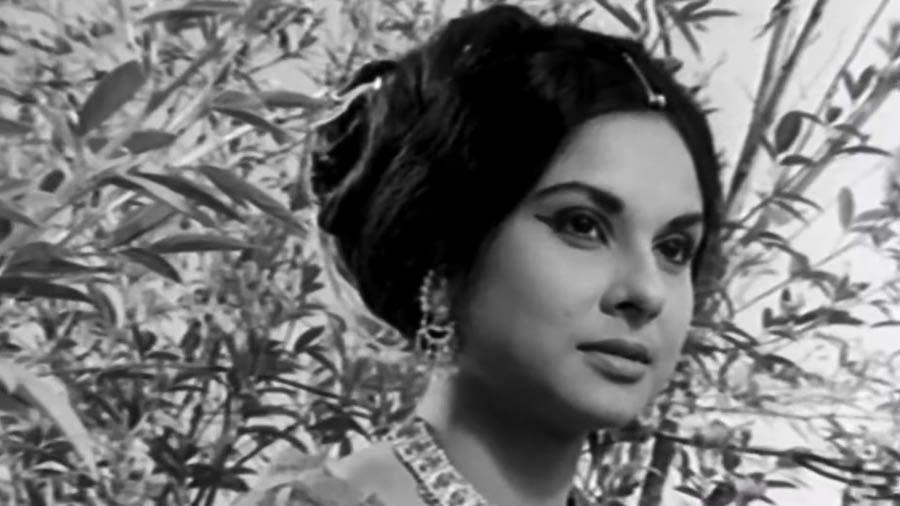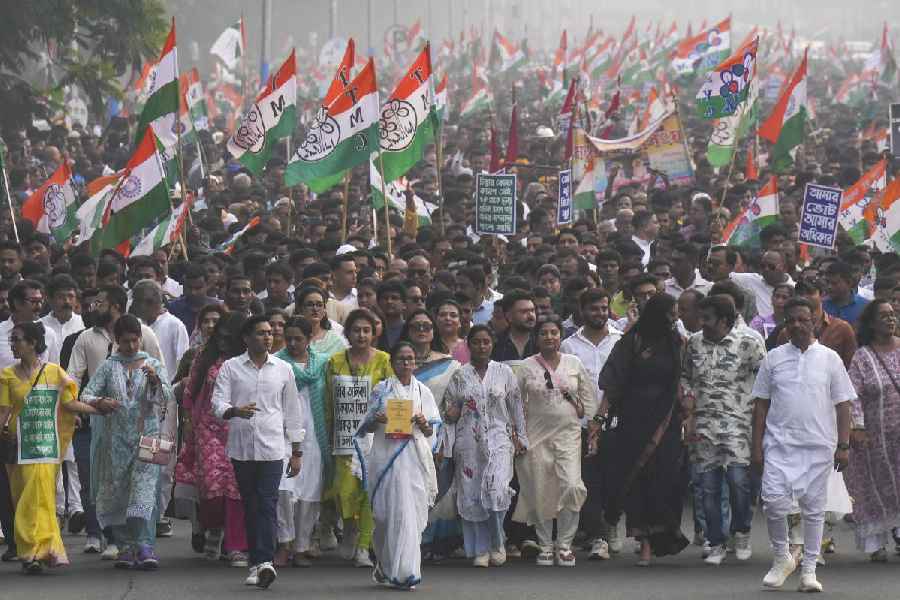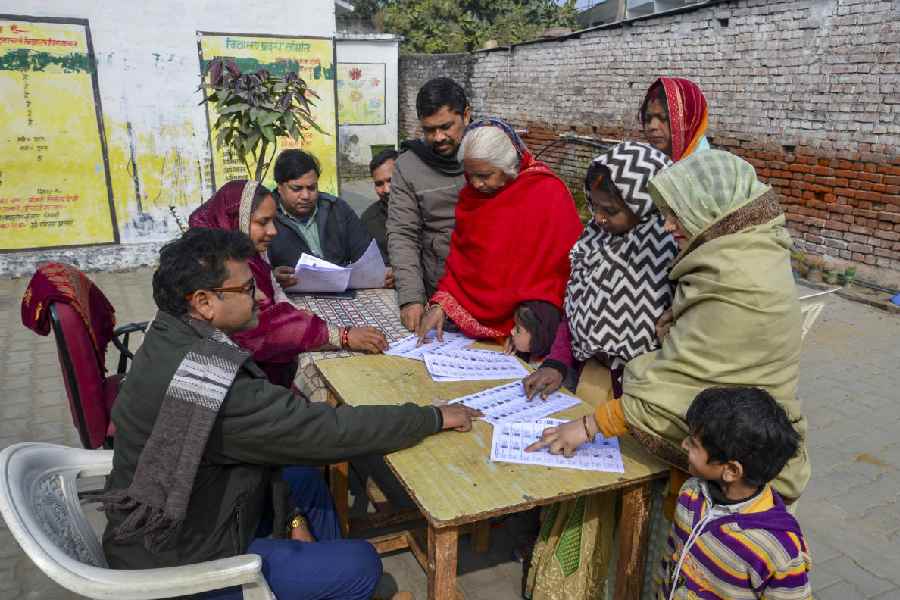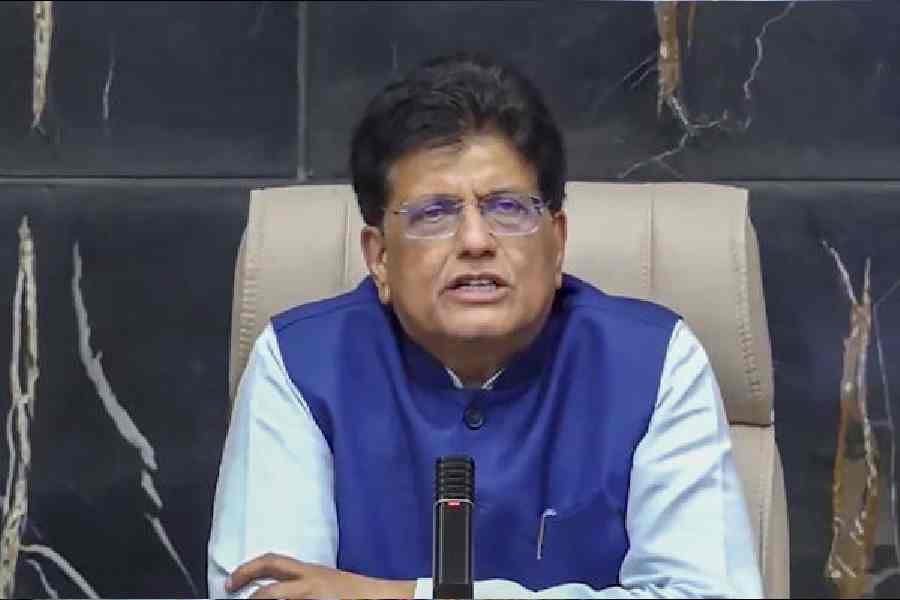Ask any contemporary actor about her favourite role, the one she would give an arm and a leg to do, chances are it will either be Rina Brown (Saptapadi) or Charu (Charulata). The shadow that Satyajit Ray’s Charulata has cast on popular imagination has arguably prevented a fuller appreciation of many of Madhabi Mukherjee’s other performances, including the one that fetched the actor her only National Award, Diba Ratrir Kabya, not to mention Baishey Shravana, Kapurush, Mahanagar and Subarnarekha.
The one aspect that defines the best of Madhabi Mukherjee’s performances is the interiority that she brings to her characters, best articulated in the intensity of her eyes, in the frown that creases her brows, the gaze, more than anything extraordinary about her appearance, often unsettling the viewer. As Andrew Robinson has said: “… in Mahanagar [she is] all natural grace and intelligence; in Charulata [she] is so finely tuned that we can enter her every thought and feeling. That, far more than her physical appearance, which can look quite ordinary, is what makes her profoundly beautiful.”
This aspect of the ‘ordinary’ was also echoed by Mrinal Sen when he described her appearance as ‘extraordinarily ordinary’. According to film scholar Chidananada Dasgupta, “As the traditional middle-class housewife … Madhabi Mukherjee is the perfect embodiment of the woman torn between self-abnegation and self-respect… Even her looks are of the housewife lost in her chores who has secretly, in her somewhere, all the enticing mystery of woman.”
On her 81st birthday, here’s a look at some of Madhabi Mukherjee’s films that have escaped the critical attention her works with the holy trinity of Satyajit Ray, Mrinal Sen and Ritwik Ghatak have garnered.
Thana Theke Aschhi (1965); directed by Hiren Nag
One of the things I have always admired about Madhabi is her ability to leave a mark in the smallest of roles. Take, for example, Agnishwar, an out-and-out Uttam Kumar vehicle (and a favourite Uttam performance). She has 15-odd minutes in the film, but it’s she who gives the film its redolent pathos.
In Hiren Nag’s Thana Theke Aschhi, Madhabi appears only intermittently and has barely a couple of dialogues. In fact, till about the 75-minute mark of this 100-minute film, she does not speak at all. Her eyes say it all, accusing, laying bare the hypocrisy of a morally corrupt society. It’s a virtuoso act, in the face of the remarkable line-up of actors she is ranged against: Uttam Kumar (though she does not have a scene with him), Kamal Mitra, Chhaya Devi and Anjana Bhowmik (just watch the subtle hint of a smile on Madhabi’s lips as Anjana tries on an ill-fitting coat – you can’t make out if she is being scornful, or whether she is smiling at all).
Brilliantly adapted from J.B. Priestley’s An Inspector Calls, a biting comment on selfishness and avarice, couched as a mystery involving an unnatural death, Thana Theke Aschhi is a solid psychological drama that derives its strength from Madhabi’s haunting, silent portrayal.
Joradighir Chowdhury Paribar (1966); directed by Ajit Lahiri
Based on a novel by Pramathanath Bishi, with a screenplay by Mrinal Sen, this one is a strange beast. A credit title card mentions the Chowdhurys of Joradighi as having descended from a line of dacoits – ‘like any other profession, this too is one’, the card cheekily tells us.
In the film’s prologue, we see one of the ancestors mistakenly killing his son-in-law, and that, another title card informs us, was the last of the Chowdhury dacoits, as the family evolved into zamindars. Its present scion is Dadababu (Soumitra Chatterjee), as he is referred to by his subjects. He, like his ancestors, loves musical soirees and hunting, but, as he tells his grandfather (wonderfully played by Kali Banerjee – the relationship between the two is a major highlight), hates the loot and plunder that is so much a part of the zamindari ethos.
He is in love with and engaged to marry Indrani (Madhabi Mukherjee), the princess of the neighbouring zamindari, Raktadaha, with whom Joradighi has had a feuding relationship for generations. A twist of fate forces Dadababu to marry Banalata (Sabitri Chatterjee), whom he rescues from the clutches of evil zamindar Parantap Ray (Tarun Kumar), thus reigniting the old hostility with Raktadaha.
Indrani swears vengeance at what she perceives as betrayal. Dismissing suggestions that they put off the wedding date, she says, steel in her voice, ‘Kaaj jemon cholchhe cholbe’ (the arrangements will go on as decided). The very picture of a woman scorned who makes the extraordinary decision of marrying Parantap to spite her ex-lover. And on her own terms, with him living as ‘ghar jamai’, she rebuffs his advances on their wedding night, telling him clearly that she hates him but silently acquiesces as he frames new rules of engagement with Joradighi that leads the two zamindaris towards a bloodbath.
Madhabi is a revelation as she, first, picks up the gun against her husband, then shames her subjects and exhorts them to ‘be men’ and fight the advancing Joradighi army. Imperious, she opens the Raktadaha gates to face the enemy and confronts her ex-lover, the prince of Joradighi, gun in hand. One seldom sees women in films taking up arms, and as essayed by Madhabi, Indrani joining the fight, taking control, is a startling, welcome contrast. This is one woman of steel, proud, not willing to be cowed into submission.
Adwitiya (1968); directed by Nabyendu Chatterjee
Well before Nabyendu Chatterjee, debuting as a director with the Jeetendra-starrer Naya Rasta (1966), gained national recognition in the late 1980s with arthouse works like Chopper (1987), Sarisreep (1987, arguably Dhritiman Chaterji’s finest performance, on a par with the more celebrated Pratidwandi) and Parashuramer Kuthar (1989), he made Adwitiya, which boasts one of Madhabi’s most nuanced performances.
Her first appearance, the regal bearing, takes your breath away. Lokkhi has been in Darjeeling for a month on a change – ‘not of the mind,’ she tells her new acquaintance Rajeev rather cryptically. They do the usual touristy rounds of Tiger Hill at sunrise and a bond develops between the two, even though a letter from his mother informs them that she has selected a girl for his marriage. He falls grievously ill and she nurses him back to health before leaving Darjeeling suddenly, writing him a note that has no forwarding address. As she says in the note, she is one of no fixed address.
Back in Kolkata, Rajeev marries Ratna (a glowing Lily Chakraborty). Immediately afterwards, he comes across Lokkhi and discovers her profession as a baiji, all decked up, entertaining customers. The relationship picks up from where it left off in Darjeeling, as the narrative inexorably moves towards its inevitable climax, leaving in its wake lives and relationships destroyed.
Though cast in the hoary tradition of the courtesan with a golden heart, Madhabi gives the cliched character a spin of her own. There’s something about her eyes that is mildly disconcerting and infinitely sad. There is no sense of the maudlin in her portrayal. Just watch her stomp off to rebuke the customers waiting for her and in almost the same breath returning, smiling demurely, hopelessly in love, to her room where Rajeev is waiting.
For the large part a one-woman show, she has admirable support from Bikash Ray, playing her husband, who has forced her into the profession. If no one quite conveys pain through her eyes like Madhabi does, no one dangles a cigarette from the corner of his mouth like Bikash Ray. And the two of them make this Nabyendu Chatterjee directorial a cut above the rest.
Dibaratrir Kabya (1970); directed by Bimal Bhowmik and Narayan Chakraborty
‘Aami meye manush – oto udaar hote chaaina’ (I am a woman… I do not want to be generous). In the light of how leading ladies in popular Indian cinema have generally been represented, particularly if they play the wife, it is quite an extraordinary statement for a woman to make. But then Supriya of Dibaratrir Kabya is no ordinary woman.
Speaking of Satyajit Ray’s uncanny feel for beauty, Soumitra Chatterjee said, ‘Ray’s sense of beauty was more about the flutter of a searching mind than about large eyes and a chiselled face.’ It is this ‘flutter of a searching mind’, this ‘enticing mystery of woman’ (as Chidananda Dasgupta described her Charu) that comes through in Madhabi’s performance in Dibaratrir Kabya. Well ahead of its time, this is one of the most fascinating explorations of female desire in cinema, unfortunately unheralded.
About Emma’s character in Madame Bovary, it has been said, ‘Emma’s drama is the gap between illusion and reality, the distance between desire and its fulfilment’ and shows ‘the first signs of alienation that will take hold of men and women in industrial societies’. That rings true for Supriya, as played by Madhabi, with her delineation of the yearnings that impel Supriya, creating one of the great characters of Bengali cinema.
Streer Patra (1972); directed by Purnendu Pattrea
Tagore’s path-breaking short story was heavily criticised when it first came out in 1913, for its harsh denouncement of the male-dominated society of the era. Written in the form of a letter that a wife pens to her husband – beginning with the commonly used word honorific ‘Sricharankamaleshu’(at your lotus-like feet) and ending with the ironic ‘Charanatalashraychhinna’ (separated from your lotus-like feet), signifying her rejection of everything she is expected to do for the sake of her relationships – Tagore’s revolutionary and forward-looking text gets the class treatment in Purnendu Pattrea’s adaptation.
The works of this poet, writer, illustrator and artist have never received the attention they deserve, maybe because Purnendu Pattrea’s filmography is limited to only a handful of films, three of which star Madhabi. And in the actor, who made the perfect Charu eight years earlier, Pattrea has just the right Mrinal.
Madhabi is in her element as the quintessential upper middle-class wife with a poetic sensibility, who over time learns to think about and question the roles she has been asked to play. And the climactic realisation, standing on the seashore, her mind made up to never go back, looking to start afresh with dignity and freedom, is as good as anything the actor has put across in her career. This is again largely a one-woman show, and Madhabi does not put a foot wrong. The film justifiably won the National Award for Best Bengali Film and the Best Director Award at the Tashkent Film Festival.
(Shantanu Ray Chaudhuri is a film and music buff, editor, publisher, film critic and writer)










